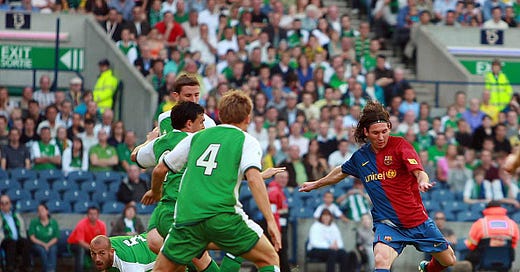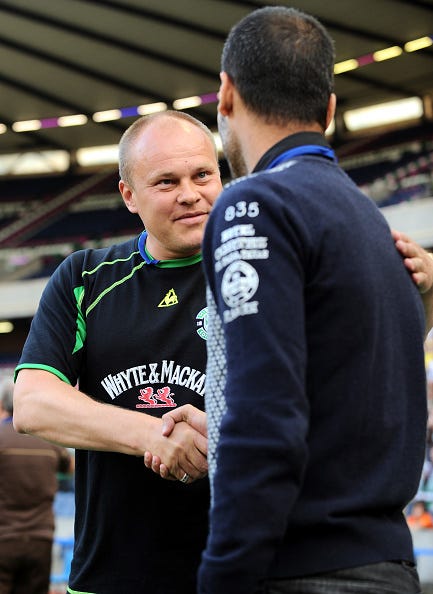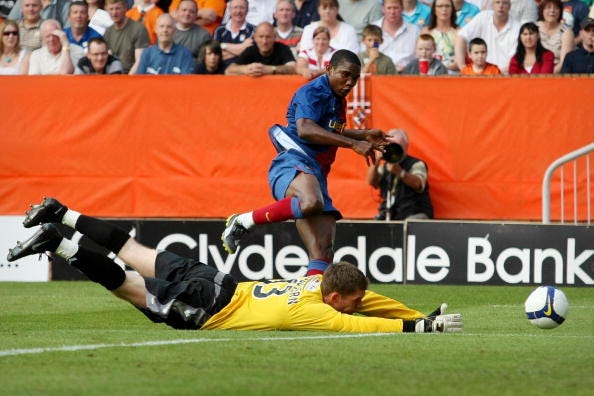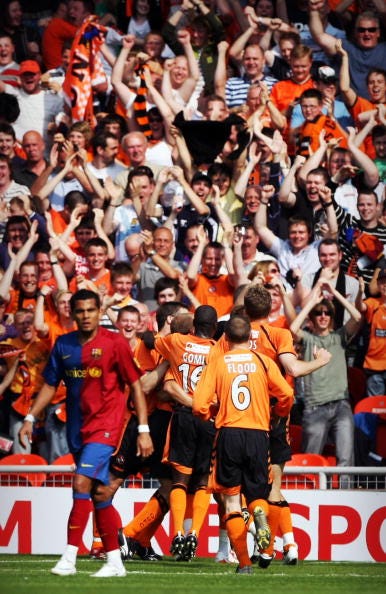'It was a different type of football' - Pep unleashes a revolution, Scotland 2008
Guardiola, Messi and the team that changed football - by the first players that faced them
What’s it like to come face-to-face with greatness on a football pitch?
When Barcelona touched down at Dundee Airport in 2008 for their second pre-season tour of Scotland in a row, the streets around St Andrews were lined with expectant football fans as the team coach made its way to the Old Course Hotel. While there was an air of expectation across the east of the country there was little to hint – in Spain or elsewhere – at what was to come in Barca's campaign ahead. Sure, their newly-installed coach, Pep Guardiola, had turned heads with his meticulous methods as coach of Barca B in Spain’s third division and, yes, Lionel Messi had finished third in the Ballon d’Or voting and was tipped as the next global superstar, but not even the most optimistic Blaugrana devotee would have predicted their side scooping an unprecedented treble with a rookie manager and an ingenu winger. But that's exactly what unfolded in a season for the ages and the acorns of that success could be found scattered all across Murrayfield and Tannadice that summer.
Their performances in Scotland resulted in a 6-0 demolition of Hibernian one Thursday evening in late July and a 5-1 win over Dundee United two days later at Tannadice.
Those who witnessed it up close suggest they saw the birth of an idea; one that brought to mind Mike Tyson’s quote about everyone having a plan until they are punched in the mouth.
Mixu Paatelainen, the Hibernian manager that evening 16 years ago, recalled having watched his side not so much punched in the mouth but battered into submission.
“We told all of our players what to do in such-in-such a situation and all that, but… after about 15 minutes, I thought: ‘Please, please let the ground open up and swallow me’. It was like a tsunami!”, The Finn told The Herald in 2022.
Speak to the players of Dundee United, who faced Barca 48 hours later, and they betray a similar sense of hopelessness.
What do you do when faced with the impossible?
Goalkeeper Michael McGovern was making his United debut as a half-time substitute.
“It was 1-1 at half-time, the game had been quite even, and then I came on. If you know Tannadice, there’s a slope on the pitch. So I came on at half-time and we’re playing up the slope against Barcelona and Messi had just came on! It wasn’t the easiest debut.
“Messi scored a hat-trick and Samuel Eto’o scored as well but I don’t think I was at fault for any of the goals. They were all good finishes. I remember for the last goal, Eto’o tried to take the ball round me one-on-one and I did really well to palm it out. I thought to myself, ‘Brilliant, I’ve saved that’, but then Messi walked in, picked up the loose ball and stuck it into the empty net because I was still on the ground. I thought, ‘Right, okay – any chance of me saving a shot here?!’
“After the game, we were all having a laugh about [Messi’s performance] in the dressing room. Paul Dixon and Danny Grainger – two left-backs – were both marking Messi at one stage. I remember the manager Craig Levein having a laugh about that in the press.”
“You wouldn’t normally catch me smiling after a 5-1 defeat,” deadpanned Levein in the post-match press conference. “We would have had to be world record holders at 1,500 metres to keep up with Barca. Obviously Messi was the one who made the difference. He was fantastic to watch.”
For all the talk about Messi, Morgaro Gomis was more concerned with another ‘great’. United had actually gone in front when Gomis’ redoubtable midfield partner Prince Buaben headed in a Warren Feeney cross after 25 minutes only for the goal to be cancelled out a mere 26 seconds later by Thierry Henry's equaliser.
Growing up playing cage football in the Parisian suburb of Le Blanc-Mesnil, Gomis would pretend to be Henry. He had watched him win the World Cup in 1998 as part of a France team that helped give a voice to the nation’s African communities. So it wasn’t Messi who Gomis was making a beeline for, it was Henry.
He laughs sheepishly: “I said, ‘Hi, I speak French, I’m from Paris, too’. And he responded, saying: ‘How are you doing? Everything okay here?’ We didn't have a long conversation.”
Pleasantries over, Gomis was blown away by what happened next. It was a day when the midfielder, who had been in Montpellier’s academy as a boy and had been on trial at Chelsea, witnessed a revolution.
“You could see the way they were playing,” he recalls. “The two centre-backs – one of them was [Rafa] Marquez – would just open up and the full-backs were pushing forward so much. And their full-backs were kind of playing as wingers. And the two wingers were coming inside, near the striker. And the centre-backs were really comfortable to play those diagonal long passes, or they would just give it to the centre midfielder. You could see that it was a different type of football. Something that not everybody was trying to do. It felt like Barca had more players because of the movement going forward. It was a very strange feeling.”
For Feeney, though, there was no such standing on ceremony. As a Northern Ireland international he had been well used to playing the plucky underdog role against global superstars.
“I was always one who didn't care too much about who I played against. I just saw it as 11 v 11. It’s probably the mentality of what we had at Northern Ireland. I was asked to do a man-to-man job on Andrea Pirlo one time against Italy. Believe me, I followed him to the toilet and still couldn’t get near him. [On that afternoon] you just couldn't take the ball off Messi. I was a massive Ronaldo fan. I played against Ronaldo as well, but playing against Messi and seeing him in real life, you just knew how special he was.”
Such was the second-half dominance that Feeney was forced deeper into his own half which in turn pitched him into Messi’s orbit if not metaphorically, at least metaphysically. On a few occasions he came into direct contact - so what was his strategy?
“I tried to kick him a few times . . . I missed.”









